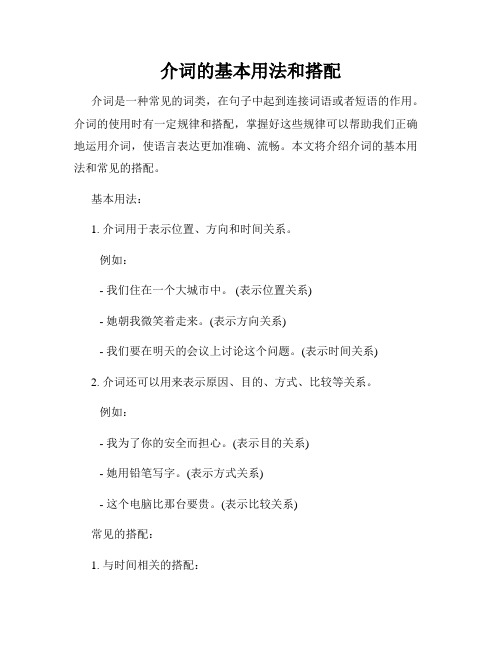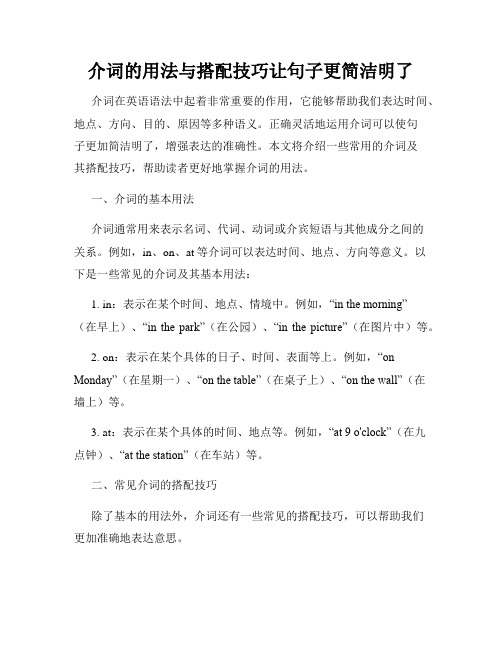4个常见介词的基本用法详细讲解
介词的用法和常见搭配

介词的用法和常见搭配介词是一种常用的词类,在句子中起连接词语的作用。
它通常用来表示时间、地点、原因、目的、方式等概念。
正确使用介词可以使句子更加准确、完整,增强语言表达的清晰度。
本文将介绍介词的基本用法和常见搭配。
一、基本用法1. 表示时间:如at, on, in等- at:用于表示具体时间点,如at 9 o'clock(在9点钟)- on:用于表示星期、日期,如on Monday(在星期一)- in:用于表示月份、年份、季节等,如in July(在七月)2. 表示地点:如at, on, in, to等- at:用于表示具体地点,如at the park(在公园)- on:用于表示某个表面或线路上,如on the table(在桌子上) - in:用于表示在某个范围内的地点,如in the city(在城市里) - to:用于表示朝向或到达某个地点,如go to school(去学校)3. 表示原因:如because of, due to等- because of:表示原因时放在句子后面,如I couldn't come because of the heavy rain(因为大雨,我不能来)- due to:表示原因时放在句子前面,如Due to the bad weather, the flight was delayed(由于天气不好,航班延误了)4. 表示目的:如for, to等- for:表示为了某个目的,如I bought a gift for my friend(我给朋友买了一份礼物)- to:表示某个动作的目的,如I went to the supermarket to buy some groceries(我去超市买了些杂货)5. 表示方式:如by, with等- by:表示某个动作的方式或手段,如travel by train(乘火车旅行) - with:表示某个工具或伴随的状态,如cut the cake with a knife(用刀子切蛋糕)二、常见搭配1. at:at home(在家)、at work(在工作)、at school(在学校)、at the airport(在机场)2. on:on the bus(在公交车上)、on the phone(打电话)、on the way(在路上)、on the Internet(在互联网上)3. in:in the morning(在早上)、in the evening(在晚上)、in the park(在公园)、in a hurry(匆忙地)4. to:go to bed(上床睡觉)、come to a decision(作出决定)、send a message to(发送消息给)5. for:for example(例如)、for sure(肯定)、for the first time(第一次)、for a long time(很久)6. by:by car(乘车)、by oneself(独自)、by accident(偶然地)、by hand(手工)7. with:play with friends(和朋友一起玩)、talk with teachers(和老师交谈)、help with homework(帮助做作业)三、总结介词是连接词语、起连接作用的重要词类。
介词的用法方式总结归纳

介词的用法方式总结归纳一、介词的基本概念和作用介词是一种独立的词类,属于虚词的范畴,主要用来连接名词、代词或者动名词等与其他成分之间的关系。
介词通常放在宾语前面,在句中起到修饰或者补充说明的作用。
下面将对常见的介词及其用法进行总结归纳,以帮助读者更好地掌握介词。
二、时间介词时间介词主要用于表示时间上的关系。
例如:at(在……时刻)、in(在……期间)、on(在具体日期或星期几)。
这些时间介词常与某些特定的时间单位连用,如年份、季节、月份、时刻等。
1. at:表示具体时刻,如at 9 o'clock(在九点)、at noon(在中午);2. in:表示较长的一段时间,如in summer(在夏季),in the morning(在早上);3. on:表示具体日期或星期几,如on Sunday(在星期天),on May 1st (在五月一日)。
三、地点介词地点介词主要用于表示人或物所处位置的关系。
常见的地点介词有at、in和on。
1. at:表示在某一具体场所,如at home(在家)、at school(在学校);2. in:表示在大的范围内或较大的地点,如in a city(在城市里)、in the park (在公园里);3. on:表示在物体表面或接触状态,如on the table(在桌子上)、on the wall (在墙上)。
四、方式介词方式介词主要用于表示行动或状态发生的方式。
常见的方式介词有by、with和in。
1. by:表示通过某种手段或方法,如by bus(乘坐公交车)、by phone(通过电话联系);2. with:表示使用某种工具或伴随着某个人或物,如write with a pen(用钢笔写字)、go shopping with friends (和朋友一起去购物);3. in:表示以某种方式进行,如send it in email (通过电子邮件发送)。
五、原因和目的介词原因和目的介词主要用于表示事物之间存在的原因关系或目的关系。
介词的用法与常见搭配

介词的用法与常见搭配介词是连接词与词之间关系的一种词类,在语法中占据重要的位置。
介词的正确使用可以帮助我们表达准确、流畅的语句。
本文将介绍介词的基本用法以及常见的搭配。
一、基本介词的用法介词通常用于连接名词、代词、动名词、动词短语等与其后面的词语之间的关系。
下面是介词的几种基本用法:1. 表示位置关系:- in(在):in the room(在房间里)- on(在……上):on the table(在桌子上)- at(在,位于):at the office(在办公室)- under(在……下面):under the chair(在椅子下面)- beside(在……旁边):beside the lake(在湖边)2. 表示方向关系:- to(到,向):go to school(去上学)- into(进入):jump into the pool(跳进游泳池)- through(通过):walk through the door(走过门口)3. 表示时间关系:- at(在某个具体时间):at 6 o'clock(在6点)- on(在某天或日期):on Sunday(在星期天)- in(在某个时间段内):in the morning(在早上)4. 表示原因关系:- because of(因为):He was late because of the traffic.(他因为交通堵塞而迟到。
)- due to(由于):The flight was delayed due to bad weather.(航班由于恶劣天气延误了。
)二、常见介词搭配介词的正确搭配可以帮助我们表达精确的意思。
以下是介词常见的搭配用法:1. be good at(擅长):She is good at playing the piano.(她擅长弹钢琴。
)2. look forward to(期待):I am looking forward to the summer vacation.(我期待着暑假。
介词的用法和举例子造句

介词的用法和举例子造句一、介词的定义和基本用法介词是英语中常见的一类词性,它在句子中充当连接词的作用,用来表示名词与其他成分之间的关系。
介词通常放在名词、代词或者动名词之前,构成介词短语。
下面将详细介绍介词的基本用法以及举例子造句。
1. 表示位置关系:- in(在……里面): My keys are in the drawer.- on(在……上面): The book is on the table.- under(在……下面): The cat is hiding under the bed.- at(在某个地点): We met at the park.2. 表示时间关系:- after(在后面): We can go for a walk after dinner.- before(在前面): I will finish my work before noon.- during(在期间): He fell asleep during the movie.- on(表示具体日期): We celebrate Christmas on December 25th.3. 表示方式或原因:- by(通过某种方式/手段):She came here by bus.- with(带有某种属性/特征):He is a man with great patience.- for(为了某个目的):I bought flowers for my mother's birthday.4. 表示目的或结果:- for(给予目标对象,针对某人或某物): I bought a present for my sister.- to(到达某个地点): He went to the supermarket to buy groceries.- so as to(为了做某事): She studied hard so as to pass the exam.二、举例子造句1. 表示位置关系:- The cat is sitting in the box, enjoying its newfound hiding spot.- The painting on the wall adds a touch of color to the room.- She found her missing necklace under the pile of clothes on her bed.- I will meet you at the café near your office.2. 表示时间关系:- We can go for a walk after dinner when it's cooler outside.- Please submit your report before 5 p.m. tomorrow.- During our trip, we visited many famous landmarks in Europe.- Our anniversary falls on September 10th this year.3. 表示方式或原因:- He solved the problem by using a calculator.- She is an artist with a unique style of painting.- I bought sunscreen for protection against harmful UV rays.4. 表示目的或结果:- He brought flowers for his wife on their wedding anniversary.- They walked to school together every day, talking and laughing along the way.- She worked hard so as to achieve her dream of becoming a doctor.总结:介词是英语中常用的词性,用来表示名词与其他成分之间的关系。
介词的基本用法和搭配

介词的基本用法和搭配介词是一种常见的词类,在句子中起到连接词语或者短语的作用。
介词的使用时有一定规律和搭配,掌握好这些规律可以帮助我们正确地运用介词,使语言表达更加准确、流畅。
本文将介绍介词的基本用法和常见的搭配。
基本用法:1. 介词用于表示位置、方向和时间关系。
例如:- 我们住在一个大城市中。
(表示位置关系)- 她朝我微笑着走来。
(表示方向关系)- 我们要在明天的会议上讨论这个问题。
(表示时间关系)2. 介词还可以用来表示原因、目的、方式、比较等关系。
例如:- 我为了你的安全而担心。
(表示目的关系)- 她用铅笔写字。
(表示方式关系)- 这个电脑比那台要贵。
(表示比较关系)常见的搭配:1. 与时间相关的搭配:- at:表示具体的时间点,如 at 7 o'clock(在7点钟);- on:表示具体的日期,如 on Monday(在星期一);- in:表示较长的时间段,如 in May(在五月)。
2. 与地点相关的搭配:- in:表示大的地区、国家或城市,如 in China(在中国);- on:表示具体位置的表面,如 on the table(在桌子上);- at:表示具体的地点,如 at the park(在公园里)。
3. 与方式相关的搭配:- by:表示通过某种方式实现,如 by train(乘坐火车);- with:表示使用某种工具或手段,如 with a pen(用钢笔);- in:表示以某种状态或方式,如 in silence(安静地)。
4. 与目的相关的搭配:- for:表示为了某个目的,如 for studying(为了学习);- to:表示向某个目标地方,如 to the library(去图书馆);- with:表示和某人或某物一起,如 with my friends(和我的朋友们一起)。
以上只是介词的基本用法和常见的搭配,实际使用中还有更多的情况和变化。
为了准确理解介词的使用,我们需要不断积累例句和实际语境的经验。
介词的用法与搭配技巧让句子更简洁明了

介词的用法与搭配技巧让句子更简洁明了介词在英语语法中起着非常重要的作用,它能够帮助我们表达时间、地点、方向、目的、原因等多种语义。
正确灵活地运用介词可以使句子更加简洁明了,增强表达的准确性。
本文将介绍一些常用的介词及其搭配技巧,帮助读者更好地掌握介词的用法。
一、介词的基本用法介词通常用来表示名词、代词、动词或介宾短语与其他成分之间的关系。
例如,in、on、at等介词可以表达时间、地点、方向等意义。
以下是一些常见的介词及其基本用法:1. in:表示在某个时间、地点、情境中。
例如,“in the morning”(在早上)、“in the park”(在公园)、“in the picture”(在图片中)等。
2. on:表示在某个具体的日子、时间、表面等上。
例如,“on Monday”(在星期一)、“on the table”(在桌子上)、“on the wall”(在墙上)等。
3. at:表示在某个具体的时间、地点等。
例如,“at 9 o'clock”(在九点钟)、“at the station”(在车站)等。
二、常见介词的搭配技巧除了基本的用法外,介词还有一些常见的搭配技巧,可以帮助我们更加准确地表达意思。
1. 表示位置关系:介词常用来表示物体或人在空间中的位置关系。
例如,“in front of”(在...前面)、“behind”(在...后面)、“next to”(在...旁边)、“above”(在...上面)、“under”(在...下面)等。
2. 表示原因与结果:介词也可以用来表示原因与结果的关系。
例如,“because of”(因为)、“due to”(由于)、“result from”(由...引起)等。
3. 表示方式与手段:介词可以表示某种方式或手段。
例如,“by”(通过)、“with”(用)等。
例如,“by email”(通过电子邮件)、“with a knife”(用刀)等。
介词的基本用法
介词的基本用法介词是语法中的一种词类,用来表示名词、代词等与其他词之间的关系。
介词通常位于名词短语前面,起到连接词语的作用。
本文将详细介绍介词的基本用法。
1. 表示地点关系介词常用于表示物体或人的位置关系,可以简明地描述地点。
例如:in(在)、on(在…上面)、at(在…旁边)、under(在…下面)等。
示例:The book is on the table.(书在桌子上。
)2. 表示时间关系介词还可以用于表示时间关系,精确描述某个事件发生的时间或持续的时间。
常用的表示时间关系的介词有:at(在某个具体时刻)、on(在某天或某个具体日期)、in(在某个时间段内)等。
示例:I will meet him at 9 o'clock.(我将在9点钟见他。
)3. 表示原因关系有些介词可以表示原因、理由或出发点,常用的有:for(为了)、because of(因为)、due to(由于)等。
示例:He went to the park because of the nice weather.(他因为天气好去了公园。
)4. 表示方式和手段介词也可以表示某个行动或状态发生的方式或手段。
例如:by(凭借、通过)、with(用、带着)等。
示例:She draws a picture with a pencil.(她用铅笔画了一幅图画。
)5. 表示目的和结果有些介词可用于表示某个行动的目的或结果,如:to(表示目的)、for(表示目的)、result in(导致)等。
示例:I am going to the supermarket to buy some groceries.(我去超市买些日用品。
)6. 表示比较和对比介词还可以用于表示比较和对比关系。
例如:than(比)、as(和…一样)、like(像)等。
示例:She is taller than her sister.(她比她妹妹高。
)总结:介词在语法中起到连接词语的作用,表示名词、代词等与其他词之间的关系。
介词的使用方法口诀
介词的使用方法口诀介词是英语中非常重要的一部分,它可以用来表示时间、地点、方向、原因等,正确使用介词可以让句子更加准确和流畅。
下面就是一些关于介词使用方法的口诀,希望对大家有所帮助。
一、表示时间。
介词in用于年、月、季节、上午、下午、晚上等时间段;介词on用于具体的某一天或日期;介词at用于具体的某一时刻或节日。
二、表示地点。
介词in用于表示大的范围或封闭的空间;介词on用于表示平面或表面;介词at用于表示具体的位置或建筑物。
三、表示方向。
介词to表示朝向某个地方或目的地;介词from表示从某个地方出发;介词across表示横穿过某个地方;介词towards表示朝向某个方向。
四、表示原因。
介词because of用于表示肯定的原因;介词due to用于表示中性的原因;介词owing to用于表示正式的原因;介词thanks to用于表示积极的原因。
五、其他常用介词。
介词by表示通过某种方式或工具;介词with表示伴随或使用某物;介词for表示为了某种目的或代表某人。
六、特殊用法。
介词in、on、at在特定搭配中有特殊用法,需要根据具体情况进行记忆和理解。
七、总结。
介词的使用方法口诀并非一成不变,需要根据具体语境进行灵活运用。
通过大量的阅读和实践,逐渐掌握介词的用法是非常重要的。
以上就是介词的使用方法口诀,希望对大家有所帮助。
在学习英语的过程中,多多积累、多多练习,相信大家一定能够掌握好介词的使用方法,写出更加地道和流畅的英语句子。
介词的用法举例
介词的用法举例一、介词的基本概念及用法介词在句子中起着连接作用,使其它部分之间形成关系,同时也能够表达出空间、时间、方式、原因等概念。
在英语中,常见的介词包括in, on, at, by, with, through等。
下面将通过举例的方式来详细讲解一些常见的介词用法。
二、表示位置与方向1. In(在...里面):例如:The book is in the bag.(书在书包里。
)There is a ball in the park.(公园里有一个球。
)2. On(在...上面):例如:I put the cup on the table.(我把杯子放在桌子上。
)The cat is sitting on the roof.(猫坐在屋顶上。
)3. At(在...处):例如:She works at a hospital.(她在一家医院工作。
)We met at the bus stop yesterday.(我们昨天在公交车站见面了。
)三、表示时间相关1. In(在...之内):例如:I will see him in an hour.(我将会一小时后见他。
)They are going to travel in July.(他们打算七月去旅行。
)2. On(在某日或某时刻):例如:We have a meeting on Monday morning. (我们星期一上午有个会议。
) The train will arrive on time.(火车将准时到达。
)3. At(在某个具体的时刻):例如:They usually have lunch at noon.(他们通常中午吃饭。
)We will meet at 7 p.m.(我们将在晚上七点见面。
)四、表示方式与原因1. By(通过...方式):例如:He goes to work by car every day.(他每天乘车去上班。
)I communicate with my friends by email.(我通过电子邮件和朋友们沟通。
介词的基本用法
介词的基本用法介词是英语中非常重要的词类之一,它在句子中起着连接和修饰其他词语的作用。
了解和正确使用介词对于理解和运用英语语法至关重要。
本文将介绍介词的基本用法,帮助读者正确理解和运用介词。
一、介词的定义和特点介词是一类虚词,它的特点是可以在单词前后都有空格,同时它通常与名词、代词、动词、形容词等构成短语结构,表达具体的关系或者修饰词之间的关系。
二、表示方位和位置的介词1. in:表示在某个范围或区域之内。
例如:in the room(在房间里)。
2. on:表示在某个物体的表面。
例如:on the table(在桌子上)。
3. at:表示在某个地点或位置。
例如:at the bus stop(在公交车站)。
4. under:表示在某个物体的下方。
例如:under the tree(在树下)。
5. behind:表示在某个物体的后面。
例如:behind the door(在门后)。
三、表示时间的介词1. in:表示在某个时间段内。
例如:in the morning(在早上)。
2. on:表示在某个具体的日期或某一天。
例如:on Sunday(在星期天)。
3. at:表示在具体的时刻或某个时点。
例如:at 7 o'clock(在7点钟)。
四、表示原因和目的的介词1. for:表示目的或者用途。
例如:I bought this book for study(我为了学习买了这本书)。
2. because of:表示原因。
例如:He was late because of the traffic (他因为交通堵塞迟到了)。
3. to:表示目的地。
例如:I went to the supermarket to buy some groceries(我去超市买了些食品杂货)。
五、表示方式和比较的介词1. like:表示相似或者类似。
例如:He looks like his father(他长得像他爸爸)。
- 1、下载文档前请自行甄别文档内容的完整性,平台不提供额外的编辑、内容补充、找答案等附加服务。
- 2、"仅部分预览"的文档,不可在线预览部分如存在完整性等问题,可反馈申请退款(可完整预览的文档不适用该条件!)。
- 3、如文档侵犯您的权益,请联系客服反馈,我们会尽快为您处理(人工客服工作时间:9:00-18:30)。
• 1、碰着、靠着:She was leaning against a tree. • 2、反对:We should fight against crimes. • 3、预防:Save money against a rainy day.未雨绸缪 • 固定搭配: • 1、go against 违反(故意违反某人的意志) • He chose to go against his family. • 2、be against • (1)违反(违反法律、制度) • It is against the law to hunt tigers. • (2)反对 Lincoln was strongly against slavery. • (3)不利于 What he said is against him.
44个常见介词的基本用法 详细讲解
• 介词短语=介词+名词 • 基本介词 +单名词 • 合成介词 +多名词 • 双介词 +名词性从句
• 1、在…周围:The kids are sitting about their teacher. • I like the necklace about her throat. • 2、环绕:The bird always flies about the forest. • I plan to travel about the world. • 3、关于:a book about English study • They are talking about the new film. • 4、[adv] 大约 • 固定搭配: • 1、How about...? • 2、something+adj+about X • 一些关于X的adj的事
4、after 基本含义:“A在B之后” (强Байду номын сангаас顺序)
• 1、在…之后 (时间顺序、空间顺序) • After dinner, they went out for a walk. • I should after him, but he still went on. • 2、照着…的样子 • Read the sentence after me, please. • The building is named after the famous hero. • 固定搭配: • 1、be after寻找/go after 追逐/run after 追求 • You should run after your own dream. • 2、after all不管怎样 (即:在任何事情之后都一样) • After all, he is your father. • 3、look after照顾
• 1、在…周围:There are many bars around the towm. • 2、在附近、到处:I showed him around our campus. • 3、【adv】大约: • There are around 1000 people watching the game.
• 引申含义: • 1、穿过:She walked across the road. • 2、在...对面: The bar is just across the street. • 3、交叉:He sat with his arms across his chest. • The two lines pass across each other at right angles. • 固定搭配: • 1、A come across B. A偶遇B。 • I came across Yu Minhong the other day. • 2、A ger sth across to B. A使某物被B了解。 • I want to get my theory across to all students.
• 1、时间上:Please come back before 10:00pm. • 2、空间上:Don’t put the cart before the horse. • 3、顺序上:Health should come before wealth. • 固定搭配: • 1、before long不久后 • 2、before time:提前
2、above 基本含义:a-b-over “A在B上方”
• 引申含义: • 1、在…上方:The sun rose above the horizon. • 2、数目大于…/重量超过…/价格(能力、地位)高于… • There is nothing in the store above 50 cents. • “He who comes after me is above me ,because he was before me” • 固定搭配: • 1、above all: 首先(强调重要性) • Above all, he was an outstanding mathematician. • 2、above all things: 最最… • What you need, above all things, is confidence. • 3、be above oneself: 兴高采烈=high spirit • When he heard the good news, he was above himself.
• 1、小地点,或小时间点 • Usually, he is at his office in the morning. • I arrived at home at 7:00. • Knock at;look at;aim at;shoot at;arrive at… • 2、表示引发某种情绪或动作的原因 • He showed no sign of pleasure at seeing her. • Be surprised/excited at…
